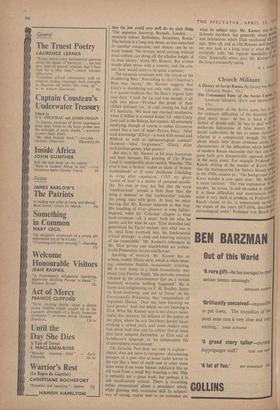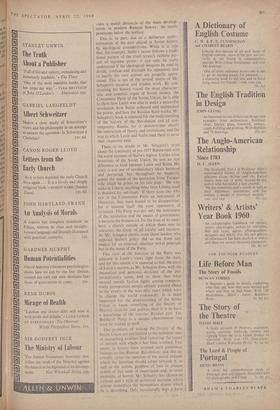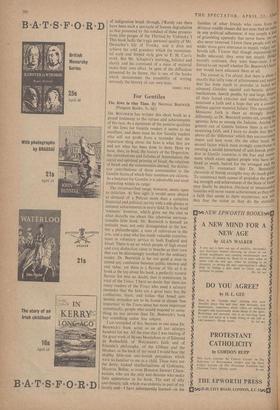Church Militant
A History of Soviet Russia. By Georg von Ran` (Atlantic Books, 50s.) fad THE interpreter of the Soviet scene has to ,31.1 the ordinary difficulties of the historian plied many times: he has to learn a sPectibe dialect of double-talk; he has to deal with the deliberate fabrication of false history by in Soviet authorities; he has to assess motives er ; relation to a complicated struggle for 10i; about which little direct evidence exists. It 0-5 characteristic of the difficulties which hist°:riall in 'is modern Russia encounter that they can 'is good faith give diametrically opposed acc°11% of the same event. For example Professor ',`111 Rauch, writing of the murder of Kirov, WI% was the starting-point for Stalin's bloody PtIrghe in the 1930s, assures us: 'The background of t.”0 Kirov murder is now quite clear.' Mr. SchaPlris is more cautious: The true explanation of th murder,' he writes, 'is still shrouded in mYste,9,:h. It is these difficulties and uncertainties wil' make it very hard to produce, as Professor Of Rauch claims to do, 'a summarised survey !.0 the events of the years 1917-1956, describe' chronological -order.' Professor von Rauch pi.'" vides a useful chronicle of the main develop- ments in modern Russian history: he rarely penetrates below the surface.
This is, in part, due to a deliberate under- estimation of the part played in Soviet history by ideological considerations. While it is true that, for example, Stalin's career follows a tradi- tional pattern of the cruel tyrant's ruthless pur- suit of supreme power, it can only be really understood if the ideological weapons he used to divide, confuse and discredit his opponents and to justify his own actions are properly appre- ciated. This is one of the several merits of Mr. Schapiro's massive and erudite work. By con- structing his history round the most character- istic and essential organ of Soviet society, • the Communist Party of the Soviet Union, he is able to show how Lenin was able to make a successful revolution, how Stalin achieved and maintained his power, and how the Russian State works. Mr. Schapiro's book is essential for the understanding of the history of the Revolution and of con- temporary Russia, for it demonstrates clearly the interaction of theory and institutions, and the way in which Lenin and Stalin used them to serve their respective ends.
There is no doubt in Mr. Schapiro's mind about the continuity of pre-1917 Bolshevism with the worst excesses of Stalin's regime. Unlike some historians of the Soviet Union, he sees no real difference in kind between Lenin and Stalin. His story is not one of revolutionary ideals betrayed and perverted, but throughout he implicitly points the moral of the quotation from Tocque- ville which he prints on his title page: 'He who seeks in Liberty anything other than Liberty itself is destined for servitude.' If there were any %% ho saw in the Communist Party an instrument of liberation, they were bound to be disappointed, for it became itself the most oppressive of tyrannies. The Party was not only the instrument of the revolution and the means of government; it became the framework for the lives of its mem- bers, a church outside of which there was no salvation, the focus of all loyalty and emotion. As Mr. Schapiro shows, even those leaders who opposed Stalin's policy did so not from any respect for an external, absolute moral principle but in the name of the Party.
This view of the function of the Party was inherent in Lenin's views right from the start., and for this reason it is essential to link the story of Lenin's success, as Mr. Schapiro does. with the theoretical and personal divisions of the pre- revolutionary years, and to show that what seemed merely faction fights among compara- tively unimportant people already pointed ahead to the events of the next fifty years which were to change the world profoundly. It is more important for the understanding of the Soviet Union to know something of the history of Marxist doctrine and politics than it is to have a knowledge of the remoter Russian past. The Bolshevik Party is a unique phenomenon and must he studied as such.
The problems of writing the history of the Soviet Union arc not limited to the technical ones of assembling evidence and removing the layers of untruth with which it has been overlaid. Few events in history have aroused such passionate feelings as the Russian Revolution; and this in- evitably raises the question of the moral attitude which the historian should adopt towards it, as well as the artistic problem of how' to present events of this scale of importance and, at some moments. of horror. Mr. Schapiro has chosen an attitude and a style of deliberate restraint which almost underplays the Momentous drama which he is describing. Only occasionally does a burst
of indignation break through. (`Rarely can there
have been such a spectacle of human degradation as that presented by the conduct of these prosecu- tions [the purges of the Thirties] by Vishinsky.') This book lacks the tragic personal quality of Mr. Deutscher's life of Trotsky, and it does not achieve the cold grandeur which the monumen- tal scale and limpid style give to E. H. Carr's work. But Mr. Schapiro's learning. balance and clarity and his command of a mass of material make their own effect. In spite of the difficulties presented by its theme, this is one of the books which demonstrate the possibility of writing seriously the history of our own time.
JAMES JOLL












































 Previous page
Previous page